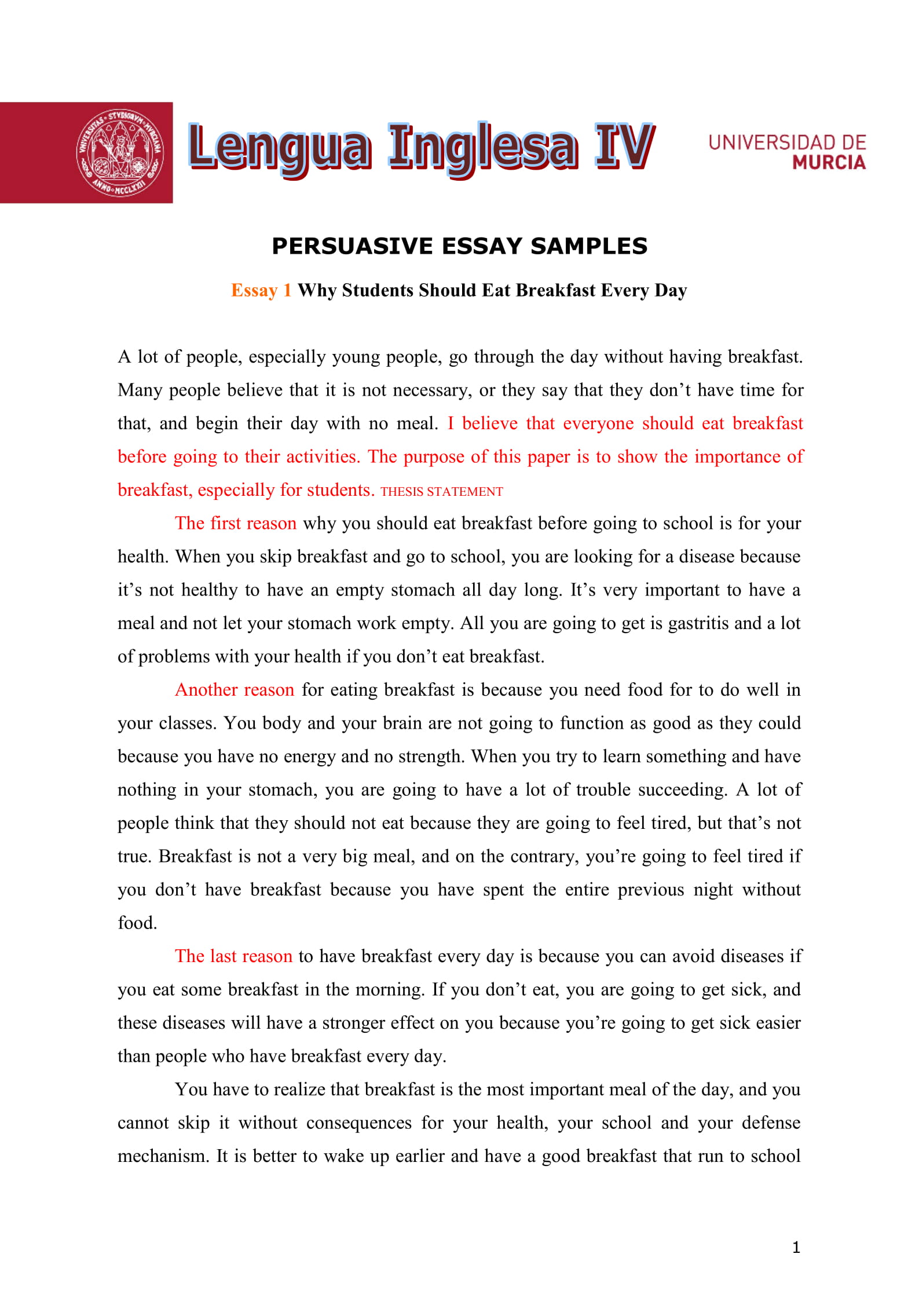How to Write a Persuasive Essay – Examples, Format, PDF
People in general have strong opinions or have their personal stance about certain issues – be it substantial or trivial. Some advocate their stance in public like rallies or demonstrations where they deliver persuasive speeches to gain other people’s approval. Some people, on the other hand, opt to do it a subtle but poignant way, through writing. You may also see essay writings.
Through the course of history, writing was used to start a revolution. Writing has its immense power of uniting the people to a specific cause. It can educate, entertain and persuade the readers. However, writing has many types, styles, techniques. etc. It is a very diverse field. You may also see short essay.
One of the most common types of writing is essay writing. According to Harvard University, “Writing an academic essay means fashioning a coherent set of ideas into an argument. Because essays are essentially linear—they offer one idea at a time—they must present their ideas in the order that makes most sense to a reader. ”
In other words, essay writing has been classified as a formal and informal form of writing. It gives the writer the avenue to give his/her own argument regarding a certain topic. However, it only topples one topic at a time and it is centered around a main topic. You may also see Basic Guide on Essay Writing.

What is a Persuasive Essay?
Persuasive writing or also known as argument essay, explains a specific topic and attempts to persuade the readers that the writer’s stance is right or a certain idea is more valid than the other. It uses logic and reason to present that one idea is more correct than the other. Through persuasive writing, the reader must be able to discern and adapt a certain point of view and take a course of action.
The writer must take a position whether he/she is FOR or AGAINST an issue. He/she must do intensive research in order to provide evidences based on facts. The argument in the essay must always use rational reasoning and well-founded evidences by presenting facts, valid reasons, analytical examples and quoting experts. You may also see argumentative essay
A persuasive essay could be about anything you have an opinion of. As long as you can present compelling evidences that support your argument. People that have strong opinions about your stance should be persuaded or even accept the evidences you present as valid. You may also see persuasive speech.
Elements of a Persuasive Essay
A clear thesis or controlling idea
This is the main focus of your essay. The flow of your paper revolves around your thesis. This establishes and sustains the focus of your paper. The thesis of your essay must be solid and distinct and avoid a vague and unsure thesis that you clearly have no background information about. You may also see free essay.
Opening paragraph
This is the introduction of your essay. It opens your whole paper to the readers and it introduces the topic of your paper. The introduction gives a short background about your essay. It gives a first impression, establishes credibility and prepares your readers to the content of your paper. It should immediately make your readers curious and interested. You may also see high school essay.
Body paragraphs
Your information or arguments are presented in the body of your essay. The body of your essay should be supported by research evidence you were able to gather. The body should contain all the information or argument you intend to convey to your readers. Do not leave room for unanswered questions in your body as it can make your essay inadequate or simply unclear. The body of your essay can be one or more than one paragraph long, depending on the length you would want to breakdown and organize your essay. Also see Content Outline Writing Tips and Examples
Smooth transitions
The flow of your essay should be polished and refined. It should go from one point to another without breaking its coherence from each other. Your readers must be able to clearly understand that you are done explaining one point and you’re going onward with another. You may also see analytical essay.
Use of counterarguments
Using counterarguments are necessary in a persuasive essay. You use counterarguments to summarize and rebut opposing positions. It helps give emphasis on the position you have taken. It also helps make your essay a well-rounded and well-versed output. Also see Debate Speech Examples
Conclusion
Your conclusion emphasizes the main point of your essay without being repetitive. Your conclusion must wrap up the main point of your essay with the help of the arguments you have presented beforehand. Although it is a ‘wrap up’ of your whole essay, you must avoid repeating words and thoughts you have already pointed out while presenting your idea. You may also see essay examples.

How to Write a Persuasive Essay
1. Take a stance
The stance you take, whether your FOR or AGAINST about an issue will dictate the direction of your essay. The information and arguments you will present in your essay will revolve around the stance you have chosen. Although it is subjective, avoid prejudice and logically explain your stance instead. Remember that your stance are to be supported by legitimate facts and evidences. You may also see scholarship essay.
2. Know your audience
Your readers have opinions of their own about a certain issue. Determine whether your audience may agree with your position and why they may not. In order to successfully contest your point of view, especially when trying to explain why a certain idea is more valid than the other, you must be able to understand both sides of the issue. You may also see student council speech.
3. Research
Thoroughly research about your topic. The point of a persuasive essay is to disprove the opposing argument through providing detailed and compelling evidences. It will likely be necessary to undertake library-based research, intensive hunt for legitimate references and thorough examination of various examples. You may also see How to Write Definition Essay and Examples
4. Structure your essay
Organize the structure of your essay by determining the logical sequence of presenting your evidences. In order for your readers to fully understand the essence of your essay, determine the information you need to include and arrange them according to the hierarchy of its importance and/or relevance to your topic and stance. You may also see literacy essay.
5. Support your stance
As you may have done your research regarding your topic, avoid simply copy-pasting or plagiarizing supporting details. Follow proper citations in your evidences. Use hard-hitting facts that are not easily rebutted. Provide meaningful examples, verifiable statistics and one or two direct quotations from experts in order to strengthen your argument. You may also see reflective essay.

Without any confusion, your persuasive essay should be able to smoothly merge the following tasks:
1. First, define your key terms or ideas. It should clear up unnecessary confusion about other topics.
2. Second, describe and analyze specific examples used in your essay. It should be able to clearly explain the examples in a level the readers can easily comprehend. You may also see expository essay.
3. Third, it should be able to summarize and evaluate the opposing opinions on your topic; meaning, your essay should be able to weigh in on the essence of the opposing argument without invalidating it. It should just be presented but logically rebutted. You may also see comparative essay.
4. Fourth, it should compare and contrast your examples and their relation to your thesis. Analyze and state the correlation of your examples with your thesis.You may also see descriptive essay.
5. Lastly, your essay must be able to connect your examples explicitly to your central idea and to each other. Directly connect the relationship of your examples with the thesis or central idea of your essay in order to prove their coherence. You may also see synthesis essay.
Persuasive Essay Example

How to Support your Arguments
1. Facts
Do not confuse facts with truths. A “truth” is an idea many people believe but it doesn’t necessarily mean it’s true. A fact, according to Merriam-Webster dictionary, is a piece of information presented as having an objective reality. Facts have evidences that prove them to be true. It can easily be obtained through research on scholarly materials, observation or actual experience. You may also see informative essay.
2. Statistics
These provide excellent support to your argument. Statistics are a collection of quantitative data gathered or combined after intensive research and/or experiments. They provide numerical and visual evidences to your argument. Always make sure you get statistics from reliable resources and you cite your sources properly. You may also see descriptive essay.
3. Quotes
A direct quote reproduces the words of another writer verbatim and is displayed in quotation marks. Although it is not recommended, paraphrasing the quote into your essay is a good way to support your argument. Find legitimate quotes from experts. Quotes can be found in published research papers, scholarly articles and books, and other research materials. You may also see travel essay.
4. Examples
Examples are closely similar cases that serves as a precedent or model, it illustrates what the idea is trying to convey. They add and improve your the meaning of the idea and at the same time, makes your idea actual and concrete. You may also see photo essay.

General Guidelines
Bear in mind that the main goal of a persuasive essay is persuade readers that the position you are going for is the most relevant position. You must have a firm opinion about an issue that you want your readers to accept. Before you start to write your persuasive essay, you must already have an opinion or a stance of your own. It is much better to have background information about certain topics before you choose what to write about. You may also see evaluation essay examples.
Always aim to grab the readers attention. You can start your essay with a grabber or hook. It can either be hard, cold facts or quotations from a reliable person that directly relates to your cause. You may also see college essay.
As it has been mentioned, a persuasive essay can be subjective, nevertheless, it still has to be objective. As much as it is about your opinion or position about the issue, it needs facts and evidences. Readers will claim your stance as false if they don’t see/read a credible source backing up your opinion. And lastly, conclude your essay with a restatement of what you want your readers to believe. Reaffirm that the statements you have presented are more valid than the other. You may also see personal narrative essay.


